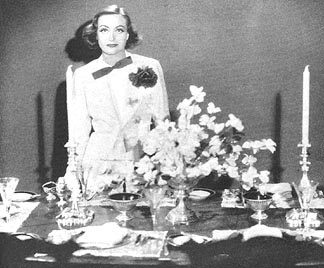The Girl Without a Past
Joan
Crawford here reveals secrets that will prove invaluable
to you if you are
earnestly seeking the road to happiness
by Dorothy
Manners
Originally appeared
in Photoplay, October 1935
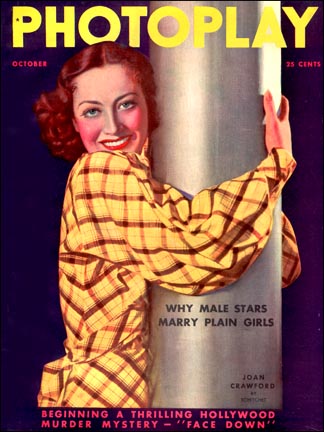 If for no other reason this interview should be unique for the reason
that I am probably the only writer in Hollywood who has not talked with Joan
Crawford in six years!
If for no other reason this interview should be unique for the reason
that I am probably the only writer in Hollywood who has not talked with Joan
Crawford in six years!
Along with Norma Shearer, Joan has earned the gratitude of the local scribes by always being helpful and available at difficult times when the Hepburns and Ann Hardings are kicking up the dust of their heels to the press, behaving as much like Garbo as possible.
But for some inexplicable reason Joan and I have not crossed paths since that day, long ago, when Joan and Doug Fairbanks, Jr., and I lunched at the Roosevelt soon after their marriage.
The proverbial water has flowed under the bridge, the New Dealers have dealt, the box-office has written new destinies in Hollywood, famous loves have been born, and died, and even the weather has changed since those throbbing days when Joan and Doug wrote love letters on the backs of hotel menus.
So, the obvious, if hackneyed, approach to this new meeting with Joan was a comparison of the past with the present.
But Joan had no more than walked onto the set of her new picture, her slim figure tailored to a wraith in a black-velvet suit, a close-fitting hat nearly covering her new, shorter haircut, that I knew my stereotyped angle had gone up in smoke.
An hour or so later, I knew that every phase of Joan is a stranger to the last one.
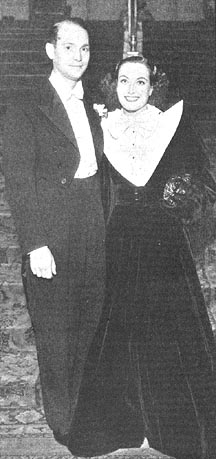 |
| Close friends know and love the Crawford that is gay, affectionate and charming. Her escort here is Franchot Tone. |
For Joan, like Emerson's "great man," has caused the past drop away from her: The great man is not a slave to his development...when we see the conqueror we do not think of any one particular battle or success...for he has caused the past to fade and disappear as an early cloud of insignificant result in a history so large and advancing.
It would no more be possible to look into the clear, polite eyes Joan turns on you, and say "Do you remember when you were the best Charleston dancer in town; or remember the crazy laugh you used to have, or the way you used to talk Pig Latin to Douglas? than you'd say: "Do you remember when you were Letty Lynton or Sadie McKee?" It would be worse than tactless, it would be dull. The loud laughing, too-plump girl of the Montmartre Cafe days, the hysterical bride, the brooding tragedienne, and all the other characters from Joan's past have become as fictional as any screen heroine she has ever portrayed.
For instance, you can't say Joan has developed a raucous flapper laugh into the sympathetic humor she exhibits today, because it is difficult to believe she ever laughed loudly.
It seems absurd to say she has developed a mentally poised woman from an emotion-tossed girl, because she conveys no suggestion of the change.
There is nothing remodeled about her personality.
All the time we talked over in a corner of the set, while Woody Van Dyke arranged and rearranged lights, while Briane Aherne and Frank Morgan chatted Britishly of the Louis-Carnera fight, I had the disconcerting feeling of talking with a friendly stranger who knew me embarrassingly better than I knew her.
When I bluntly told Joan this she was neither as amused or as surprised as she might have been, considering that her past is being continually paraded before the public in that endless series of "How Much Joan Crawford Has Overcome."
She said: "I believe I know what you mean. And if it is true, I think it is because I've tried to make a point of living no closer to myself than the present.
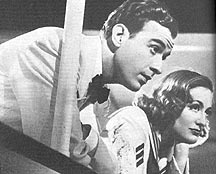 |
| Joan, the brooding tragedienne, is a character from her past. Above, a scene from "Glitter," with Fred Keating |
"For instance, I've been criticized for being a faddist about my home, in decorating and redecorating it with what my critics call 'every change of mood.' That's absurd, of course. But I couldn't live in that house if not a stick of furniture had been changed from the way it was when I first moved in. Because the same person isn't living there!
"It seems funny to be saying this now, because I was a long time learning that I really wanted to escape from my own personal dramas, that I had to escape if there was going to be any real happiness in the future for me.
"This business of escaping from the past isn't an easy thing, particularly for women," she hesitated thoughtfully. "The first step, of course, is to really want to escape. And women cling so dramatically to the past. As a sex, we color and theatricalize every experience out of all proportion.
"A great many women, too many, wear their heartbreaks as conspicuously as they wear their bracelets!
|
"That is the way it should be with our Life lessons.
"I mean it when I say the only important part of my life is the present and the future. I am grateful for everything that has ever happened to me, but I refuse to be a slave to it."
I asked Joan if there were any particular rules she had followed in acquiring this philosophy.
She laughed. "But rules are one of the most important things to avoid! The only sure way to break away from the ties and influences of the past is to live our lives unburdened by privately concocted rules.
"It is possible, you know, to learn a lesson too well, to be hampered and narrowed by experiences.
"These rule ideas about our future are nothing more than stupid left-over measures from the past!
"I've heard women, emerging from some personal upheaval, make the remark: 'I shall never fall in love again,' or, 'I shall never trust that type of person again.' Many people pamper themselves with the idea that they can fall in love with only a certain type, or nationality, or color of eyes or that they can't drink coffee at four o'clock in the afternoon or other silly things like that. And for what reason? Because some unhappy emotional or digestive experience in their past has clamped onto their growth in the future!
"That is the reason I loathe the words never or always applied to myself. I always think that never is shutting me off from something important and untried, and always is confining me to the trivial and familiar. Even in the smallest and most inconsequential matters I hate personal rules.
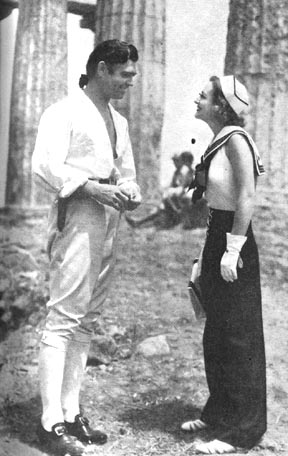 |
| Joan and Clark Gable meet and exchange a laugh on the set. Her laughter today has a new ring to it |
"Another time someone wrote that I never read anything lighter than biographies. Well, I like caviar to eat, too, but I don't eat it all the time. I have a collection of murder mysteries that would do credit to any circulating library in town, and I'm crazy about reading them."
When Joan came back to our corner from a very long and involved scene with Brian Aherne before the camera, she said:
"These things are trivial, of course, but the same principle has to be applied to the real important things if we are going to grow and develop by new, and not discarded things.
"After all, what is more important in life than new experiences, and, if we're lucky enough to live colorfully, new adventures? Nothing imaginable could be more stupid than talking with a man who has only one idea, or a musician who played only one piece, or a philosopher who has read only one book.
"And certainly nothing is duller than the person who is continually telling you how much he has overcome, or lived down, or how better and uninspiring his life has been in the past.
"I don't believe that people really overcome anything if they can't escape it!
"There's a lot of difference in getting the most out of every available experience, and living through it, and in having it live through you the rest of our life.
"The only thing important to bring along with us from the past are worthwhile friends. None of us are so rich that we can afford to drop a true friendship by the wayside, as we can cast off emotions and ideas. I used to be so intolerant of people, so impatient. But I hope I have learned differently."
Van Dyke needed Joan before the camera again, and our time was growing short. Stocking-footed, Joan walked with me to the entrance of the sound stage.
Suddenly, and impulsively, she thrust out her hand like a frank boy and smiled as she gripped my hand.
"Come out and see me, Dorothy, come often...the world's still full of a lot of things for us to laugh about!"
I'm going to accept that invitation. I'd like to know this Joan as well as I have known many of the others. But probably to keep acquainted with her, I'll have to call once a week at least!
A perfect
hostess, a marvelous dinner, charming guests.
Mix well, and presto! -- a
successful dinner party
|
Joan Crawford, celebrated hostess, discovered long ago the secret which spells success for the lady with a salon...
She begins serving such marvelous food! Guests grow expansive over good food. they talk better, they are in a perfect mood to enjoy each other and the hospitality of their hostess.
Here is one of Joan's favorite menus for a small dinner party:
The first course is a fruit appetizer, served in a tall stem glass, very cold. Take equal parts of diced fresh pineapple and strawberries -- or whatever berries are in season. Place a tablespoon of mint ice in the glass, fill with the fruit, and decorate with mint leaves. Have the pineapple peeled and diced the night before, and left in the refrigerator immersed in sherry wine, if you like. Also, use a little powdered sugar if the fruit needs sweetening.
ALMOND SOUP is the next course. For this, you will need three pints of chicken or veal stock, half a pound of almonds, one small onion, three tablespoons of butter, three tablespoons of cornstarch, salt, paprika, and one cup of whipping cream. Blanch the almonds and bring in the meat chopper to a coarse meal. Melt the butter, add cornstarch and one cup of broth to make a smooth paste. Then add the almonds to the remaining soup stock, heat a few minutes, add salt and paprika and the cream. Mix together, serve in bouillon cups with a few floating almonds, and cheese straws.
ROAST SQUAB is the ideal meat for a nice dinner. It is not necessary to stuff these birds. Place some onion and sections of orange in the drawn bird. Avoid washing if possible. Wipe with a damp cloth, in preference. Washing the birds toughens them and takes away the flavor. A good chef never puts water on fowl. Place the squabs close together in a roasting pan. Fasten the legs to the back. Brush the breasts with butter. Have the oven very hot for the first five minutes, then reduce the heat and bake one hour, or until tender. It is better not to cover the roasting pan, if you baste them frequently with melted butter.
WILD RICE belongs with squab and fowl of all kinds. For six services, use half a pound of wild rice. Wash it in a sieve until the water runs clear. Place in a bowl, cover with six cups of cold water, and allow to soak over night. When you are ready to cook it, drain the water off, place rice and half a teaspoon of salt, in the upper section of a double boiler. Steam for fifteen minutes. Serve piping with plenty of butter. No more water is needed on the rice to cook it, as it has been absorbed enough. More will make it soggy.
GREEN PEAS are a perfect accompaniment. Cook them slowly for twenty-five minutes in a covered heavy vessel, with no water. Instead, use half a head of lettuce. Add a bunch of green onions, cut in rounds. The water in these vegetables cooks and flavors the peas. Add a teaspoon of sugar and salt. When cooked, add half a pint of heavy cream, butter, and serve. These are delicious, and you can leave out the cream for every day. Once you have cooked this vegetable this way, you will always want to.
For salad, Joan prefers a mixture of plain green vegetables. French endive, if it is in your market, watercress, lettuce and chicory. With a plain French dressing. Another nice salad for a squab dinner, is sections of Mandarin oranges (can be purchased in tins) with lettuce and simple dressing.
The nicest dessert you can serve is crepes Suzette, the luscious French pancake. And much easier to accomplish than you think. The batter consists of one cup of flour, three well beaten eggs, two cups of milk, one-half teaspoon sat, one tablespoon of olive oil, the greated rind of an orange, and a teaspon of sugar. Mix eggs and flour first, add other ingredients. Have your griddle hot, pour the batter on thinly and spready evenly by turning the griddle until the surface is covered. If it is a large griddle, you will need a little practice to turn such a large pancake, but it is really very simple. When baked a light brown on both sides, cut the cake in the center, to make two services. Butter lightly, spread with currant jelly (Bar le Dub, preferably), roll up, and dust with powdered sugar. Pour burning brandy over, and serve in flames.

